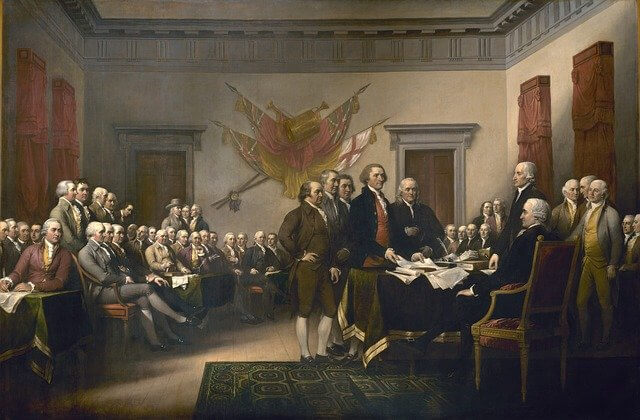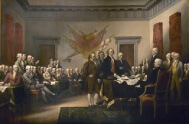Our Lives, Our Fortunes, Our Sacred Honor

While most of our posts are light-hearted or humorous; others are not. Today’s post is one such post.
Presenting colorful sketches on life is our aim. Today’s post will be colorful, but the colors of black, gray, orange and red will fail to bring laughter to your voice or smiles to your face as the sketch of life we share unveils the solemn colors displayed in the horrific destruction of life; the black of ashes, the gray of smoke, the orange of fire and the red of shed blood. The colors that founded our country.
Where we live today, the United States of America, it is a republic that protects our inalienable rights and establishes the framework for the unsurpassed freedoms we experience in our everyday lives. This is our experience while others spread across the globe, in stark contrast, experience very limited freedoms.
We live here, in free America, because 56 individuals, men of great wealth who enjoyed the comforts and luxury their money and estates afforded them, declared their independence from the over reaching powers of Britain with their signatures on the Declaration of Independence.
They signed the document which included these words, “…we mutually pledge to each other our lives, our fortunes and our sacred honor.”
Most of us know little, if anything, of this level of commitment. Most of us have never been called upon to commit our lives, our fortunes and our sacred honor to anything. A few have, but most have not. These 56 men were and they did.
We tend to hold a fairy tale picture in our minds of the lives these men lived after having signed this document. Yes, we understand the budding republic went through the ravages of the Revolutionary War, but even so, we tend to picture the signers of the Declaration of Independence as having lived a charmed life following their bold declaration.
Nothing is further from the truth.
The following, copied from a broadly circulated email, lays out some of what happened to these men following their signing of their names to that document, the pledging of their lives, their fortunes and their sacred honor on that fateful day of July 4, 1776. A fateful day, because as you will see, for many of these committed individuals the future unfolded in a series of events wherein their pledge resulted in the total loss of life, fortune and sacred honor.
At some point in our future, Americans may be faced with the decision of whether or not to do the same. A decision upon which may hinge the fate and the quality of our own future existence.
——————————————————————————
Have you ever wondered what happened to the 56 men who signed the Declaration of Independence?
Five signers were captured by the British as traitors, and tortured before they died.
Twelve had their homes ransacked and burned. Two lost their sons serving in the Revolutionary Army; another had two sons captured.
Nine of the 56 fought and died from wounds or hardships of the Revolutionary War.
They signed and they pledged their lives, their fortunes, and their sacred honor.
What kind of men were they?
Twenty-four were lawyers and jurists.
Eleven were merchants.
Nine were farmers and large plantation owners; men of means, well educated, but they signed the Declaration of Independence knowing full well that the penalty would be death if they were captured.Carter Braxton of Virginia, a wealthy planter and trader, saw his ships swept from the seas by the British Navy. He sold his home and properties to pay his debts, and died in rags.
Thomas McKeam was so hounded by the British that he was forced to move his family almost constantly. He served in the Congress without pay, and his family was kept in hiding. His possessions were taken from him, and poverty was his reward.
Vandals or soldiers looted the properties of Dillery, Hall, Clymer, Walton, Gwinnett, Heyward, Ruttledge, and Middleton.
At the battle of Yorktown, Thomas Nelson, Jr., noted that the British General Cornwallis had taken over the Nelson home for his headquarters. He quietly urged General George Washington to open fire. The home was destroyed, and Nelson died bankrupt.
Francis Lewis had his home and properties destroyed. The enemy jailed his wife, and she died within a few months.
John Hart was driven from his wife’s bedside as she was dying. Their 13 children fled for their lives. His fields and his gristmill were laid to waste. For more than a year he lived in forests and caves, returning home to find his wife dead and his children vanished.
January 22, 2021 – by Derrick Urquhart

